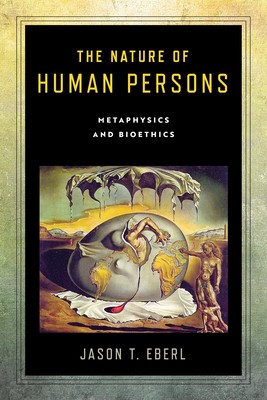
- We will send in 10–14 business days.
- Author: Jason T Eberl
- Publisher: University of Notre Dame Press
- ISBN-10: 0268107734
- ISBN-13: 9780268107734
- Format: 15.2 x 22.9 x 2.7 cm, hardcover
- Language: English
- SAVE -10% with code: EXTRA
Reviews
Description
Is there a shared nature common to all human beings? What essential qualities might define this nature? These questions are among the most widely discussed topics in the history of philosophy and remain subjects of perennial interest and controversy. The Nature of Human Persons offers a metaphysical investigation of the composition of the human essence. For a human being to exist, does it require an immaterial mind, a physical body, a functioning brain, a soul? Jason Eberl also considers the criterion of identity for a developing human being--that is, what is required for a human being to continue existing as a person despite undergoing physical and psychological changes over time? Eberl's investigation presents and defends a theoretical perspective from the thirteenth-century philosopher and theologian Thomas Aquinas. Advancing beyond descriptive historical analysis, this book places Aquinas's account of human nature into direct comparison with several prominent contemporary theories: substance dualism, emergentism, animalism, constitutionalism, four-dimensionalism, and embodied mind theory. These theories inform various conclusions regarding when human beings first come into existence--at conception, during gestation, or after birth--and how we ought to define death for human beings. Finally, each of these viewpoints offers a distinctive rationale as to whether, and if so how, human beings may survive death. Ultimately, Eberl argues that the Thomistic account of human nature addresses the matters of human nature and survival in a much more holistic and desirable way than the other theories and offers a cohesive portrait of one's continued existence from conception through life to death and beyond.
EXTRA 10 % discount with code: EXTRA
The promotion ends in 19d.00:42:04
The discount code is valid when purchasing from 10 €. Discounts do not stack.
- Author: Jason T Eberl
- Publisher: University of Notre Dame Press
- ISBN-10: 0268107734
- ISBN-13: 9780268107734
- Format: 15.2 x 22.9 x 2.7 cm, hardcover
- Language: English English
Is there a shared nature common to all human beings? What essential qualities might define this nature? These questions are among the most widely discussed topics in the history of philosophy and remain subjects of perennial interest and controversy. The Nature of Human Persons offers a metaphysical investigation of the composition of the human essence. For a human being to exist, does it require an immaterial mind, a physical body, a functioning brain, a soul? Jason Eberl also considers the criterion of identity for a developing human being--that is, what is required for a human being to continue existing as a person despite undergoing physical and psychological changes over time? Eberl's investigation presents and defends a theoretical perspective from the thirteenth-century philosopher and theologian Thomas Aquinas. Advancing beyond descriptive historical analysis, this book places Aquinas's account of human nature into direct comparison with several prominent contemporary theories: substance dualism, emergentism, animalism, constitutionalism, four-dimensionalism, and embodied mind theory. These theories inform various conclusions regarding when human beings first come into existence--at conception, during gestation, or after birth--and how we ought to define death for human beings. Finally, each of these viewpoints offers a distinctive rationale as to whether, and if so how, human beings may survive death. Ultimately, Eberl argues that the Thomistic account of human nature addresses the matters of human nature and survival in a much more holistic and desirable way than the other theories and offers a cohesive portrait of one's continued existence from conception through life to death and beyond.


Reviews